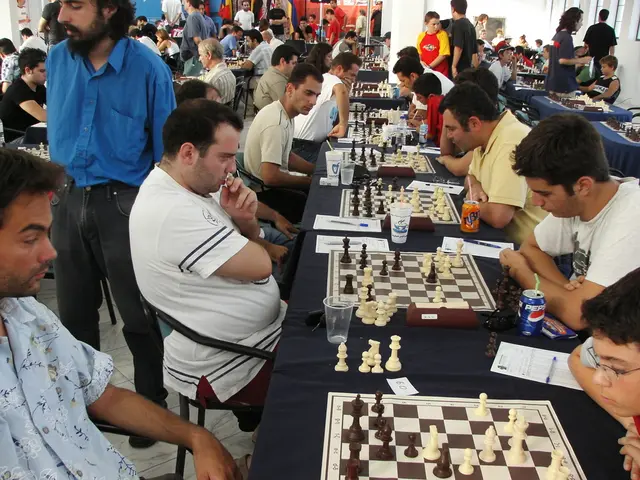Mastering Mental Endurance: The Thinking Quality That Distinguishes Successful Individuals from Pretenders
Building Strategic Patience in Poker: A Key to Long-Term Success
Strategic patience is a vital skill in the game of poker, one that goes beyond traditional notions of discipline at the table. It's about cultivating resilience within your own mind, a mental fortitude that helps you navigate the emotional ups and downs of the game.
This form of patience isn't just about letting go of the need to "get it back" right away. It's about accepting card-dead stretches or rough sessions without spiraling, and it's about riding out internal storms, tolerating discomfort without acting impulsively, and not chasing pots out of boredom or tilt.
Developing strategic patience in poker involves a blend of discipline, timing, and emotional control. Emotional patience, a quality often overlooked but crucial, is the patience that matters most. It's about staying grounded after losing a few pots in a row, sitting with frustration after a bad beat without reacting to it, and being willing to grind low or mid-stakes longer than your ego wants.
Strategic patience is built on three rare skills: emotional regulation, impulse control, and long-term thinking. These skills are interconnected. When you're emotionally patient, you make better tactical decisions. When you're developmentally patient, you're less likely to chase short-term wins. And when you build all three, you become the kind of player who can weather any storm while still playing your A-game.
Playing tight and selectively is a fundamental strategy for developing strategic patience. Focus on playing only the best hands instead of engaging with every dealt hand. Folding weaker hands protects your bankroll and reserves chips for stronger situations, which is crucial for building strategic patience.
Be patient to act mainly when the odds and betting context favor you. Do not be tempted to chase low-value hands hoping for unlikely outcomes; recognize that poker rewards those who wait for good opportunities. Observe opponents closely, paying attention to their playing styles and tendencies. Understanding who bluffs regularly or plays conservatively helps you time your bets or folds patiently rather than reacting impulsively.
Consider pot odds and probabilities carefully before committing chips. If the potential reward justifies the risk, commit with confidence. In Pot Limit Omaha, patience means folding poor hands and only engaging with strong ones. While in slow playing big hands can be costly, patience in hand selection is essential.
Manage your bankroll and emotional state carefully. Set limits and do not risk more than you can afford to lose. This financial patience helps avoid tilt and impulsive decisions that degrade strategic play. Balance patience with tactical aggression, especially in advanced formats like deep-stack or Short Deck variants.
Tactical patience is the most visible form of patience and involves waiting for the right spot, folding hands that are technically "fine" but not +EV in a specific spot, not rushing to call, raise, or bluff just because of inactivity, and letting position, opponent tendencies, and stack dynamics dictate involvement. Strategic patience sets players apart from the rest by allowing them to pause, observe, and make decisions based on logic, timing, and long-term EV, not based on emotion or ego.
Continuing to study and work on your game even when your results haven't caught up yet is a testament to your strategic patience. It's about understanding that poker is a marathon, not a sprint, and that consistent effort and patience will lead to long-term success. Embrace strategic patience, and watch your poker game soar to new heights.
[1] "The Psychology of Poker: Winning without Losing Your Mind" by Alan Schoonmaker [2] "Poker Math that Matters" by Ed Miller, Andrew Brokos, and Smyrnaios Gavril [3] "Modern Poker Theory: Volume 1" by David Sklansky and Mason Malmuth [4] "Excelling at No-Limit Hold'em: Reading Poker Tells" by Matthew Janda
In the realm of online discussions, a blog on casino-and-gambling could delve into various topics, including strategic advice for poker players. For instance, an article titled "Mastering Strategic Patience: The Key to Unbeatable Poker Blog" could cover the topic of building strategic patience in poker games, highlighting the importance of emotional patience within this competitive casino-game, such as poker.
In a related thread on a casino-games forum, enthusiasts might discuss strategies like playing only the best hands rather than every dealt hand, notably in games like casinos' poker, to build strategic patience and protect one's bankroll. This could lead to a post titled "Cultivating Strategic Patience: Tips to Succeed at Poker in Online Casino-Games Forums".




